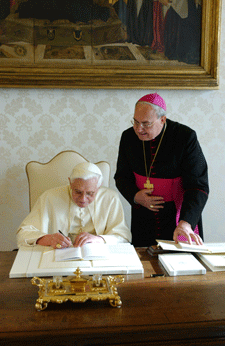In his new encyclical, Caritas in Veritate (Charity in Truth), Pope Benedict XVI makes a persuasive case that the current global financial crisis is about more than economics; it is also about ethics. As such, he provides us with a moral framework for moving forward as one human family to address the challenges facing the world today.
At the core of the encyclical is the essential connection the Holy Father makes between charity and truth. He reminds us that, unless we accept the truth about the human person and the ethical requirements for just living, charity is easily reduced to sentimentalism by which “love becomes an empty shell, to be filled in an arbitrary way. In a culture without truth, this is the fatal risk facing love. It falls prey to contingent subjective emotions and opinions, the word ‘love’ is abused and distorted, to the point where it comes to mean the opposite.”
This is why all true charity begins with social justice and promotes the common good. “If we love others with charity, then first of all we are just towards them. Not only is justice not extraneous to charity, not only is it not an alternative or parallel path to charity: justice is inseparable from charity, and intrinsic to it. Justice is the primary way of charity” (emphasis mine).
The task of exercising charity in truth is particularly challenging for humanity in the present age as the world becomes more globalized. The Holy Father notes that, “as society becomes ever more globalized, it makes us neighbors but does not make us brothers.” The answer is that we are called to practice charity in a way that secures the common good. “This is the institutional path–we might also call it the political path–of charity, no less excellent and effective than the kind of charity which encounters the neighbor directly.”
Pope Benedict also insists that there is one Catholic teaching that unites the church’s moral and social doctrine, such that the teachings about the protection of human life and dignity, the defense of marriage and the family, the protection of the poor, the pursuit of economic justice and the practice of solidarity are all one. The pope warns against “certain abstract subdivisions of the church’s social doctrine,” insisting that “respect for life… cannot in any way be detached from questions concerning the development of peoples… Openness to life is at the centre of true development of resources. When a society moves towards the denial or suppression of life, it ends up no longer finding the necessary motivation and energy to strive for man's true good. If personal and social sensitivity towards the acceptance of a new life is lost, then other forms of acceptance that are valuable for society also wither away” (emphasis mine).
These are serious times that call for serious thinking. In a time when our society is too often preoccupied with the sensational, distracted by the scandals of the moment, and overwhelmed by so much information and so little perspective, the Holy Father challenges us to put aside shallow fixations and take up the real issues that require our united attention: “Insignificant matters are considered shocking, yet unprecedented injustices seem to be widely tolerated. While the poor of the world continue knocking on the doors of the rich, the world of affluence runs the risk of no longer hearing….”
In the midst of the present economic situation when so many in our own nation and around the world lack decent work and struggle for the necessities of life, when so many fear for what the future might bring for their children or their retirement, our Holy Father offers a moral framework for economic life, a word of hope, a call to solidarity and a challenge to work together to build an economy that is founded on charity and truth. The task ahead of us is nothing less than a serious moral obligation. As Pope Benedict XVI writes in his encyclical:
“The current crisis obliges us to re-plan our journey, to set ourselves new rules and to discover new forms of commitment, to build on positive experiences and to reject negative ones. The crisis thus becomes an opportunity for discernment, in which to shape a new vision for the future.”








